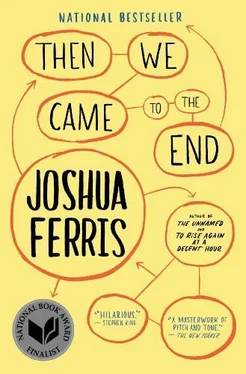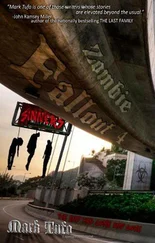He wanted so badly to talk to his wife. He was reminded of that distant, phantasmagoric episode in his life when he had stood at the pawn shop fingering a Luger. He recalled all the pills he had hoarded, and the time he sat in the garage with the key in the ignition, towels plugging every gap where the exhaust might escape, so that once he had the nerve to turn over the engine, it would be done. Who was that person? Not him, not any longer. He wanted to live! He wanted to landscape! He wanted more than anything just to call his wife.
“Oh, put your hands down, Carl,” said Tom. “I’m not going to shoot you, you fuck.”
“I thought you wanted to start a landscaping company,” said Carl. “I’ve been thinking about it all morning. The sun on my neck, remember? You and me — I could come up with some money, I love the idea. Why would you want to do something stupid?” He clattered unthinkingly, hoping to say the right thing.
“Listen to me, Carl,” said Tom. “Carl, shut up! Listen to me. I’m dressed like a clown because every single one of you fucks in this office at one time or another thought that Tom Mota was nothing but a clown, am I right? Be honest with me, Carl. Am I right?”
“To be honest with you, Tom, it’s hard to be honest with you when you’ve got a gun pointed at me.”
“I’m not going to shoot you, Carl! Just be honest. Everybody thought I was a clown, didn’t they?”
“I think,” Carl began, trying to breathe, to contain his fear, to gauge what action he might need to take, “I think everyone knew you were going through a tough time, Tom. . and that you probably. . you weren’t behaving like your normal self. I think that’s —”
“In other words,” said Tom, “a clown.”
“I never once heard anyone use that particular expression,” replied Carl, who still had his hands up.
“Carl, will you relax, please, Jesus. It’s not a real gun. Doesn’t anybody know the difference? Here, watch —”
Tom pointed the gun at one corner of the office and pulled the trigger. Splat! went the pellet, and a dousing of red paint coated the corner walls in a comic-book-like blot. Carl looked in wild-eyed astonishment, yet still refused to put his hands down. His shirt was dusted with red blowback from the pellet. He looked back at Tom.
“Are you fucking crazy?” he asked.
“No, I’m a clown,” said Tom. “And you know what clowns do, don’t you, Carl?”
“No, you fucking maniac!”
“Careful, Carl,” said Tom, motioning with the gun to the backpack in the seat beside him. “I might have a real one in there.”
“What do clowns do?” asked Carl, a little more mildly.
Tom warped his mouth into a severe hangdog frown and raised his brows to complete a picture of melancholy. “We’re such sad creatures at heart, us clowns,” said Tom. “Down-and-out and full of woe. So to make ourselves feel better —” Tom’s face blossomed into a smile like a flower drawn from his sleeve — “we pull pranks!”
JOE NEEDED A NICKEL. He could have sworn that when he left his office he had had every coin he needed to get a pop from the machine but he was shy a nickel and had to return. He took it from the mug where he kept spare change and left the office again, spying Benny and Marcia and Amber and Larry in the hallway engaged in some new drama, not exactly working on winning the new business. The elevator doors had yet to close again and he raced to catch them. If he had lingered in the hall to speculate why they were all in hysterics, they would have silently accused him of scolding them from afar, and that was a tired accusation — though on this occasion it would have been correct. Because Jesus Christ, did they not understand? We had to win the new business!
He returned to the cafeteria on fifty-nine to buy his pop and was about to leave when he saw Lynn sitting in the far back at one of the round tables under the bright and appalling fluorescence. “What are you doing down here?” he asked, approaching her. She was alone and, despite all the noise he had made, the dropping coins and the falling can, she seemed to be taking notice of him for the first time.
She watched him draw closer, two fingers at her temple.
He set the pop on the table. She kicked out a chair for him. He sat down and opened the pop and the thing hissed and spit and he hunched over to slurp up the fizzing soda before it spilled over.
They sat in silence. Then she spoke to him again of things they had gone over yesterday after Genevieve had left the office — which partner would oversee the effort to secure the new business, and the ways in which he, Joe, would need to step up and assume more responsibility.
“Can I ask you a question?” he said.
“Of course.”
“Why did you lie about it to Genevieve yesterday, and then tell me the truth after she left?”
She removed her two fingers from her temple and turned them into a kind of shrug and then returned them to her temple. “I just don’t want them to know about it until the last possible second,” she replied. “I want to be in the hospital under anesthesia before they start talking.”
He nodded. “Understandable.”
“And I know I can trust you to keep it to yourself.”
They sat in silence, the only sound the refrigerated hum from the vending machines in the distance.
“Not that I believe I’ll be able to escape it,” she said. “I’ll be way, way under and their voices will probably still penetrate.”
He smiled. “Probably,” he said.
“But until they carry me kicking and screaming toward the operating room in one of those terrible green gowns, I’d prefer to keep them in the dark. Or at the very least, second-guessing.”
She sat up and placed her feet back inside her heels. She glanced over at him as she did so. “It’s very quick,” she said, “from what they tell me. A day or two and they have you out of there.”
“Is it next door?” he asked.
“Yes. Carl’s wife, actually.”
“No kidding.”
“She scares me.”
“Is that why you missed your first appointment?”
She nodded.
“What’s changed?”
“I have a friend,” she said. “He isn’t letting me get away with it this time.”
“You have a friend,” he said. He smiled.
“Is that so hard to believe?”
“No.”
“It isn’t a boyfriend,” she said.
“I’m happy to hear you have a friend,” he said. There was silence, then he said, “Do you feel sick, Lynn?”
“Do I feel sick,” she said. She thought about it. “Yes. I feel sick.”
“Would you like me to be there during the operation? Or is there something I can do for you afterward?”
“You can win this new business,” she said.
“For you, I mean.”
“That would be for me,” she said. “This is it, Joe. This is my life.”
He was silent. “You’ve worked hard.”
“Yes,” she agreed. She had finished putting on her shoes and was now sitting perpendicular to the table with her hands holding her knees. “Too hard?”
There was a note of vulnerability in the question that he wasn’t expecting. But it was also clear, the way she was looking at him, that she wanted him to answer truthfully. “I don’t know,” he said. “What’s too hard?”
“All these other people have so much going on in their lives. Their nights, their weekends. Vacations, activities. I’ve never been able to do that.”
“Which is why you’re a partner.”
“But what am I missing? What have I missed?”
“Have you been happy doing it?”
“Happy?”
“Content. Has it been worthwhile? The work.”
“Yes,” she said. “Maybe. I suppose.”
“Then you may be better off than they are. Many of them would prefer not to be here, and yet this is where they spend most of their time. Percentagewise, maybe you’re the happiest.”
Читать дальше












